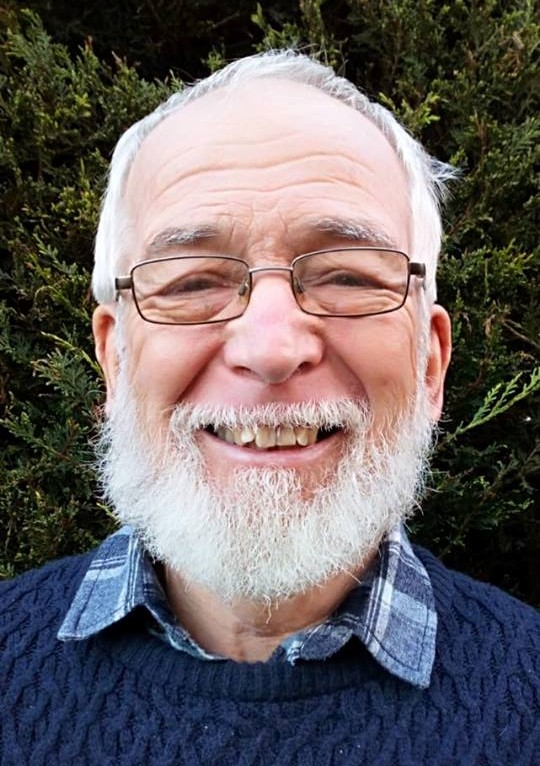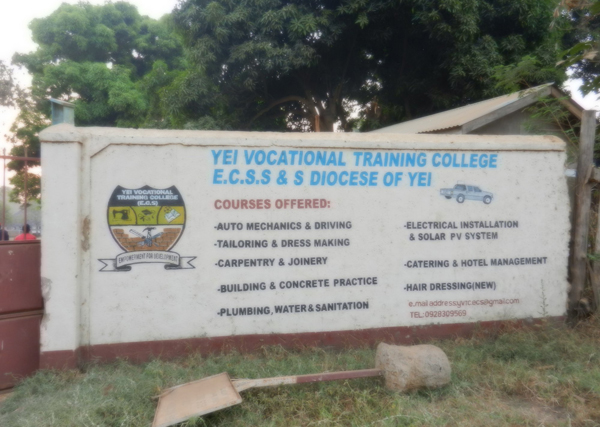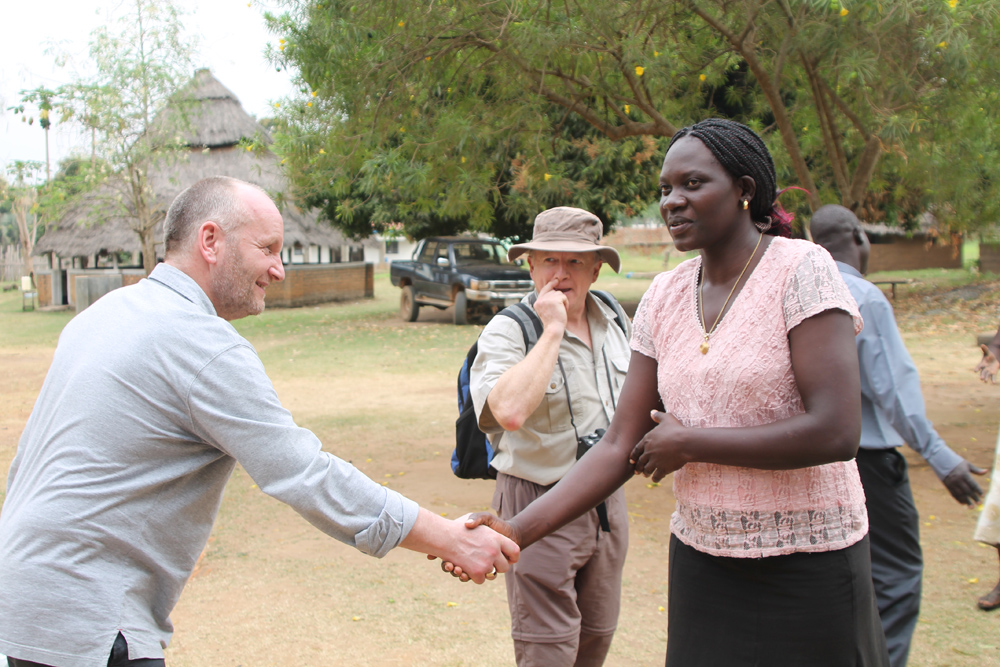Billy and Jenny Smyth return to South Sudan
In 2003, Billy and Jenny Smyth, St John’s Parish, Moira, took the courageous decision to take their young family from the relative security of Uganda to live in Yei, South Sudan, which was two years into a ceasefire.
Now Billy will once again leave his home to spend time in Yei as he tries to help the people there to rebuild their lives, just months after another fragile ceasefire.

Billy, now retired, and Jenny, Mission Director of CMS Ireland, were the first Anglican mission partners to move into Sudan following the 2003 ceasefire.
A former maintenance fitter in Belvoir Park Hospital, Billy’s first calling with CMS Ireland was to the Church of Uganda in 1994. Here he met Jenny, a mission partner with CMS England, and the couple married in 1996.
Billy worked in Kiwoko Hospital, 50 miles north of Kampala, and Jenny was an occupational therapy tutor in Malarga Hospital in the capital. After their wedding Billy moved to Mengo Hospital in Kampala.
CMS Ireland asked them to go to Arua in northern Uganda to work with Sudanese refugees in the West Nile Ecumenical Training Centre, and the couple moved there in 2001 after coming home for the birth of their daughter Abigail. Today, Arua is once again the site of vast refugee camps, housing thousands of South Sudanese who fled their homes in the most recent civil war.
Billy taught carpentry, building and vehicle maintenance to Sudanese refugees and occasionally they would have to travel into Sudan to visit the diocese.
The West Nile Training Centre was set up at the request of the Bishop of Yei. The ferocity of the war meant it had to be located over the Ugandan border.
When a ceasefire was signed in 2001, Bishop Hilary felt the time was right to relocate the Training Centre in Yei. Billy and Jenny answered his call after the birth of their son Caleb in 2003, moving into a basic house plastered with sand and cement and with a tin roof. The house had no mains electricity the family initially relying on solar panels on the roof to charge the batteries for their lights, power and the satellite phone, although they later acquired a generator.
“When we first went to Yei it was very eerie. Yei was like a ghost town, most of the people were still in the refugee camps. Thankfully, it was very peaceful,” Billy said.

Their home, and the Vocational Training Centre (VTC) which they developed, was on the site of a former army compound, and in those early days was still littered with rundown buildings and rusting abandoned vehicles.
In 2007, when Billy and Jenny returned to live in Moira, the centre had 55 staff, including teachers and carpenters. The students were mostly young Sudanese men, refugees returning home or demobilised soldiers.
Women could also learn new skills at the centre. Under the micra-enterprise scheme local women received small loans to set up businesses ranging from tea shops to basket weaving.
When Billy and Jenny returned home, CMS Mission Partners John and Poppy Spens took their place in Yei and oversaw the continued development of the VTC under local leadership.
A Connor team visited Yei Vocational Training College in January 2010. At the time it had 90 full-time students. Students who graduate return to their villages and pass their skills on to others. In January 2013, a second Connor team which included the Bishop of Connor, the Rt Rev Alan Abernethy, travelled to Yei, and ran a week-long clergy training course in a large tukul at the VTC.

The 2005 peace agreement led to independence for South Sudan in 2011 and hopes for lasting peace were high. But over Christmas 2013, as Bishop Alan was preparing to lead another team to Yei the following month, violence again erupted and the visit was cancelled.
South Sudan fell into yet another bitter conflict resulting in tens of thousands of deaths and the displacement of five million people. Many fled to refugee camps over the border, or to camps for internally displaced people within South Sudan.
With an easing of tensions, Billy and Jenny returned to Yei in July 2016 with their children for a short family visit. Abigail and Caleb were keen to meet up with the children they had played with at the VTC compound. But while they were there, the situation deteriorated.
“We had to leave very abruptly,” Bill said. “We arrived on the Saturday and had to be airlifted out by MAF (Mission Aviation Fellowship) on the Monday. The children didn’t even get to meet their friends. The airstrip in Yei is some distance from the town and we met an army checkpoint. The soldiers were told not to let anyone pass and it was a very threatening situation. The MAF plane was circling overheard, and after some tense negotiations they let us pass.”
Billy has since been in Uganda twice, once with Abigail and a youth group from the family church in Moira, and last October, with a CMSI team which attended a Peace and Reconciliation Conference in Arua.
Billy has now been invited by Bishop Hilary to go to Yei and look into the possibility of reopening the VTC. Bishop Hilary’s vision is to offer hope to young people through vocational training opportunities and he sees this as a vital ingredient in establishing the current fragile peace process.
Billy will also take part in the Peace Conference planned for February 8th-10th – a follow up to the Arua conference in October. He said this follow-up conference will be as important as the work he will be doing at the VTC.
The conference will take place in Immanuel Cathedral, Yei. Billy said that the town had remained remarkably intact through the recent conflict, and attributed this largely to the brave decision by Bishop Hilary to remain in Yei throughout the conflict.
“The reason that Yei escaped most of the ransacking that occurred in other towns is because Bishop Hilary stayed and was an encouragement to the people,” Billy said. “Other dioceses in South Sudan give credit to him that Yei is fairly intact. His presence in the town was very significant, and it cost him considerably. His home was attacked and by the grace of God he wasn’t there at the time.”
Bishop Hilary travelled regularly to meet with the people of Yei in the refugee camps, including the huge Rhino Camp in Arua which Billy visited in October.
“Things were beginning to look more settled. People were hopeful that they were turning a corner, but over Christmas there were a few hiccups. The main road from Yei to the Ugandan border has been closed again,” Billy said.
While he can prepare for addressing the conference in Yei, Billy cannot prepare so well for his return to the VTC, as he doesn’t know what to expect.
“I am told that everything is still there, but it will not be quite as we left in 2007. A big part of my work was to source funding. Over the past few years, to cover costs, there was a tendency to sell off equipment. The local economy has collapsed, so we cannot expect new students to pay fees. The place will need a huge cash injection.”
The VTC is located on church land close to Immanuel Cathedral. “Reopening the training centre will be a very high profile project in the diocese. Having it up and running again will be a psychological and morale boost for a couple of million young people who have lost out on an education. It will offer them the opportunity to learn practical skills in just a few months,” said Billy.
“My priority will be to work out budgets, what the costs will be per student. Hundreds of young people are waiting.
When we were there in 2005, we helped families relocate back in Yei as we were able to give the fathers jobs, and they brought their families home with them. I find it really, really difficult to see these people back in refugee camps. For some of them they have been refugees three times round.”
As to his hopes for the future. Billy said it depends on your degree of optimism. “Bishop Hilary says the peace agreement is working, yet others are setting up a five-year plan for clinics in the camps,” he said.
He described conditions in the camps as ‘dire.’
“The UN is really overwhelmed by the need. Schools are functioning but how well is a different matter. We visited a school at the edge of one of the camps in October. There were 400 pupils and only three classrooms.”
Billy outlined some shocking UNHCR statistics (October 2018).
• 5.5 million South Sudanese children are malnourished
• 2.2 million South Sudanese Children are not receiving an education
• 86 per cent of learners are at least five years older than their grades
• 50 per cent of the South Sudan population displaced in camps in other countries (2 million) or internally displaced (2.5 million)
“Reopening the VTC may be a drop in the ocean but it could be quite a significant drop,” Billy said. “It may be that this will not be my last trip. I may have ongoing involvement with the centre through short visits in the coming years.”
Billy will leave for Yei on January 31st, travelling via Amsterdam, Kigali in Rwanda and Entebbe, and following the conference and his work at the VTC, will return home on February 24th, 2019
• Connor Diocese has been in partnership with the Diocese of Yei, South Sudan, since 2007.
Read more news from the Diocese of Connor here.


